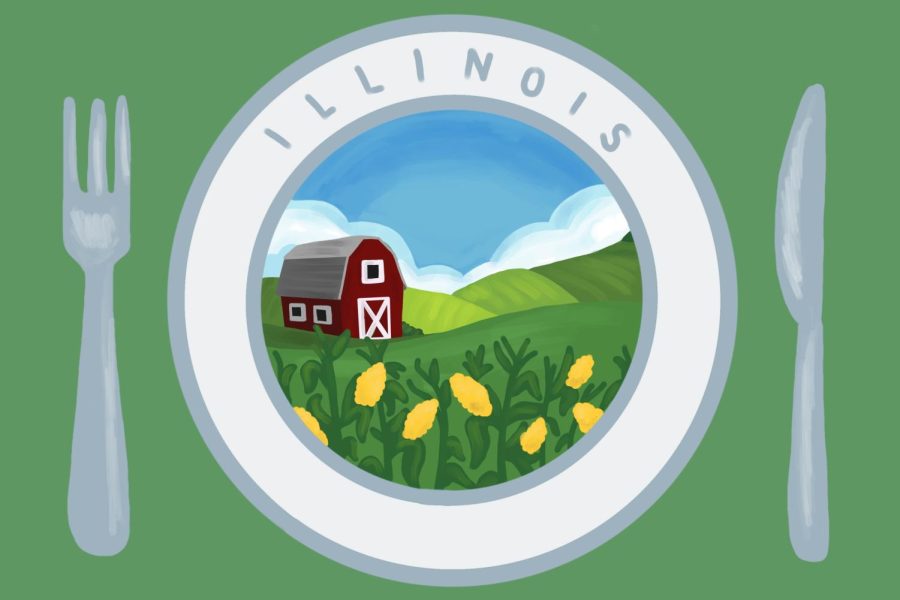Local Food Infrastructure Grant Act looks to increase access to Illinois-produced food statewide
The Local Food Infrastructure Grant Act will bolster infrastructure for farmers to distribute their goods across the state.
April 17, 2023
Joshua Snedden, co-owner of Fox at the Fork Farm in Monee, Illinois, says there’s a lot of faults in Illinois’s local food infrastructure. Snedden says without a food processing facility nearby to turn his harvested vegetables into canned goods for the slow season, tomatoes that could be sold at grocery stores end up in compost piles instead.
“If we could capture the summer harvest in our canned goods that we could sell throughout the winter, it would help us feed our community but also generate revenue and then help our farm and other farms be more sustainable,” Snedden said.
The number of local food processing facilities in Illinois may soon increase with the Local Food Infrastructure Grant Act, introduced by Sen. David Koehler (D-Peoria) in February. The act proposes a $2 million state-funded matching grant program to invest in food infrastructure in the state. Grant recipients must match the funding they receive to various degrees.
This funding will encourage local food producers to install infrastructure that will increase distribution of their goods across the state.
The act will also create a program administered by the Illinois Department of Agriculture to assist local food growers in purchasing specific equipment or fulfilling other infrastructure needs to allow them to distribute their goods.
“If you take the fact that 95% of the food that we consume in Illinois is purchased from outside of our borders, then really we should instead try to focus on how we can help farmers and growers and producers here in the state,” Sen. Koehler said.
Snedden said he would use the grant money to create a cannery for his farm. He and others could use the machine to can their vegetables to sell in the off season.
He said this would not only be a resourceful way to utilize excess produce, but it could also pump money back into the local economy and generate jobs.
“There’s a real economic benefit because it would create jobs that would create more revenue streams for local communities and local farmers,” Snedden said.
Kathleen Mueller, a policy organizer who worked with Koehler on the bill, said the lack of local food infrastructure, including mills and access to refrigerated trucks, is a main concern among Illinois farmers.
She added that many of Illinois’s neighboring states, such as Michigan and Wisconsin, have similar state-funded grant programs in place to increase local food availability.
“We kind of modeled the Illinois bill off of a combination of different pieces from other states and came up with what the farmers thought would be most beneficial for Illinois,” Mueller said.
According to the Illinois Food Farms and Jobs Council Report from 2013, a 20% increase in local food production will generate an additional $20 to $30 billion of new economic activity annually in Illinois.
Koehler also said the bill looks to promote the diversity of agriculture across the state.
“Illinois has a richness of products,” Koehler said. “Rather than spending the transportation dollars and polluting the environment to send products 1,000, 2000 miles away, let’s try to concentrate on what we can do here in the state of Illinois.”
Since this is an appropriations bill intended to fund a specific state program, it will be included in the annual Illinois state budget. The state budget will be voted on before the end of the legislative session in May.
Snedden said he sees the bill as an economic boon for local economies.
“When you invest in a local person, that local person is also your customer,” Snedden said. “They’re not just a business owner who’s going to take that dollar and leave. We’re also buying from the local stores… that dollar is staying here, not going somewhere else.”
Email: [email protected]
Twitter: @katewalter03
Related Stories:
—‘See what smaller vendors have to show’: Evanston indoor farmers market offers mushrooms, vegan soaps
— ‘It’s all about community’: Evanston Farmers’ Market to reopen this spring
— Rep. Robyn Gabel (D-Evanston) becomes Illinois House majority leader












